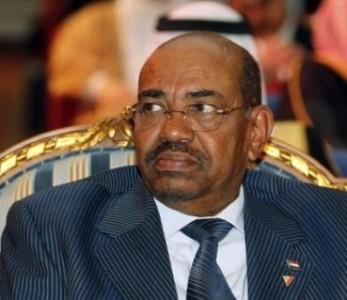Sudan’s Bashir leaves door open for re-election, backs Ethiopia’s dam
June 21, 2013, (KHARTOUM) – The Sudanese president, Omer Hassan al-Bashir has hinted today that he could run for re-election in the upcoming presidential elections on the ruling National Congress Party (NCP) ticket.

At the time several officials, including Bashir’s second vice-president al-Haj Adam Youssef, said that it is not up to Bashir to make a decision on his political future but the NCP.
Al-Bashir, who was addressing the NCP’s Shura Council seventh session on Friday, said that the media made conclusions on the issue of his candidacy without being fully informed adding that his re-election will be determined by the NCP’s General Convention and the Shura Council.
The head of the NCP’s Shura Council, Abu Ali Majzoub, on his part asserted that the NCP will nominate Bashir again in 2015.
“We will not approve any candidate other than Bashir”, and addressed Bashir saying “We will only accept you, and we want you to continue holding the torch”.
Bashir said that the NCP will review its statute in preparation for the 2015 general elections and urged the opposition parties to get ready for the polls instead of working overthrow the government.
He went on to say that if the opposition aims at organizing mass street protests with the aim of having army will take its side “we tell them that we are not the Socialist Union (SU)”.
The Sudanese leader was referring to the SU which was the ruling party during the regime of Sudan’s ex-president Gaafar Al-Nmeiri who was deposed after a popular uprising in April 1985 prompting the army to abandon him.
On the economic front, Bashir pointed out that the government’s tab for subsidizing fuel, wheat, and electricity amounts to 14 billion pound SDG ($ 3.2 billion), while the government budget is 25 billion pound SDG ($ 6.4 billion).
Last year, the government launched a package of tough austerity measures, including scaling back fuel subsidies to close a fiscal gap, sparking short-lived protests.
Earlier this month, Sudan’s minister of finance and national economy Ali Mahmoud Abdel-Rasool urged the parliament to authorize gradual lifting of subsidies in order to reduce inflation.
Sudan’s finances have tightened since oil-rich South Sudan seceded from the north in July 2011. The new state contained 75% of the country’s pre-partition oil reserves.
Bashir also spoke of the new constitution that is being formulated and said that government is consulting several stakeholders so that the law of the land accommodates all political forces “except those who refuse”.
The opposition vowed not to take part in the process unless the NCP agrees to cede power and form a transitional government that prepares the country for elections.
Sudan is currently governed by an interim constitution which was ratified following signing the 2005 Comprehensive Peace Agreement (CPA) with South Sudan rebels.
Bashir stressed that Sudan will continue its fight against the world which is he said controlled by the Zionist alliances and scoffed at the concept of “international justice” saying it is run by the U.S.
“We continue to exist against their will” said Bashir who is wanted by the International Criminal Court (ICC) on genocide charges related to the Darfur conflict that broke out in 2033.
The Sudanese president acknowledged that his government had in the past provided support for rebel groups fighting the government of South Sudan.
“We will not deny that we used to arm and support the southern opposition as South Sudan does [now to Sudanese rebels], however we ceased our support after signing of the cooperation agreements”.
In September of last year, both Sudan and South Sudan signed a series of cooperation agreements, which covered oil, citizenship rights, security issues, banking, border trade among others.
Last March, the two countries signed an implementation matrix for these cooperation agreements.
Earlier this month Sudan’s president ordered halting the flow of Juba’s oil through Sudan’s territory. He said the decision was in response to Juba’s continued support to rebels battling Khartoum.
The move was seen as a major setback to the agreements.
DAM BENEFICIAL to EGYPT
In his first public endorsement for the controversial Ethiopian renaissance dam, Bashir said that the dam “will not stop the water from Egypt” and added that it will only be used for electricity generation, calling for continuation of consultation among all concerned parties.
He acknowledged the “sensitivity” of the water issue for Egypt, saying that Sudan and Egypt’s water shares will not be impacted during the dam filling period.
The Sudanese president also expressed doubt the Nile Basin Initiative (Known as Entebbe agreement), which he said “ came from the World Bank not from the Nile Basin countries.
The Grand Ethiopian Renaissance Dam, formerly known as the Millennium Dam is being constructed on the Blue Nile 40km from the Sudanese border.
Egypt and Sudan had previously argued that the construction of the dam would negatively affect their water shares and insisted the project should be blocked, calling on international donors against funding it.
Egypt believes its “historic rights” to the Nile are guaranteed by two treaties from 1929 and 1959 which allow it 87 percent of the Nile’s flow and give it veto power over upstream projects.
But a new deal (Entebbe agreement) was signed in 2010 by other Nile Basin countries, including Ethiopia, allowing them to work on river projects without Cairo’s prior agreement.
(ST)
